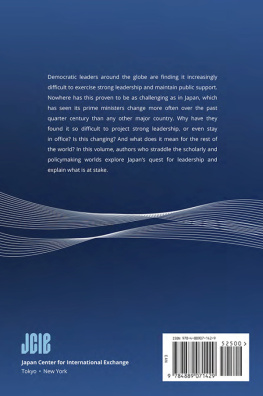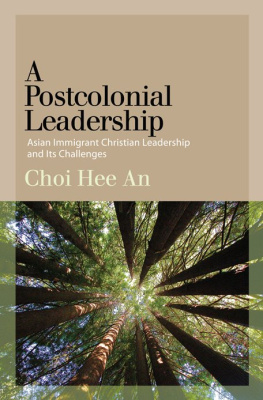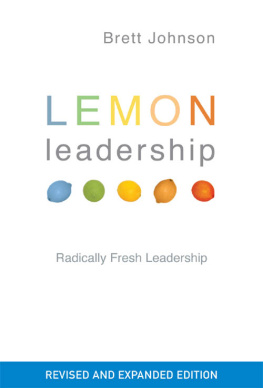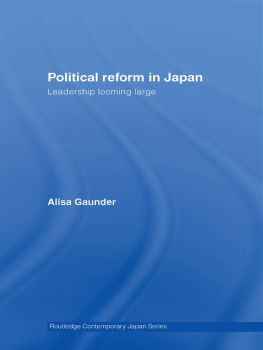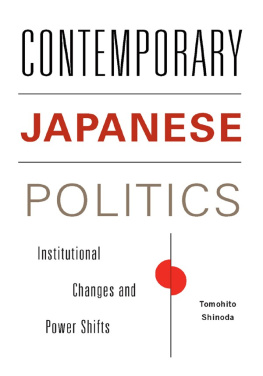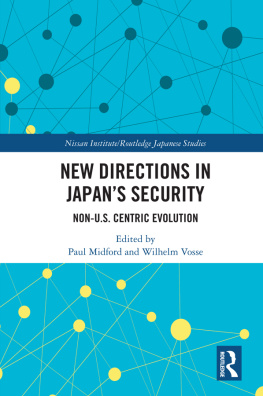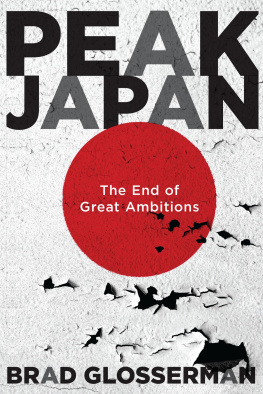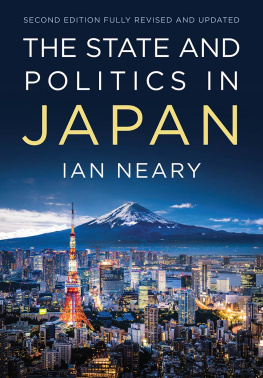About the Contributors
Yuka Uchida ANDO served as political secretary to Foreign Minister Seiji Maehara from September 2010 to March 2011, essentially acting as his closest aide on policy affairs. Prior to that she spent a decade working in the secretariat for the Democratic Party of Japan, most recently as the manager of its International Department. She is currently working toward a PhD in international relations at Japan's National Graduate Institution for Policy Studies.
Ando has also been a public policy scholar at the Woodrow Wilson International Center for Scholars, a visiting fellow at the Brookings Institution's Center for Northeast Asian Policy Studies, and a visiting fellow at the Middle East Institute in Washington DC. From 2000 to 2002, she served as special assistant for political affairs at the Japanese Embassy in Kuwait. She received her BA from Keio University and an MA from Johns Hopkins University School of Advanced International Studies. She has authored a number of publications and received the Yomiuri Commentary Award for the Next Generation in 1998.
James GANNON is the executive director of JCIE/USA, the American sister organization of the Japan Center for International Exchange, where he oversees a wide range of research, dialogue, and exchange programs that strengthen US-Japan relations and encourage deeper international cooperation. Before joining JCIE/USA in 2001, he was a researcher with the Japan Bank for International Cooperation, and from 1992 to 1994 he taught in Ehime Prefecture as part of the Japan Exchange and Teaching (JET) Program.
Gannon graduated from the University of Notre Dame, conducted graduate research at Ehime University, and has a master's degree in international affairs from Columbia University. He is co-editor of A Growing Force: Civil Society's Role in Asian Regional Security (2013) and the author of Strengthening US-Japan NGO Partnerships on Humanitarian ResponsesLessons from 3/11 (2015), as well as numerous other reports and articles on US-Japan relations, the role of transnational civil society, and Asia's evolving regional order.
Yuichi HOSOYA is a professor at Keio University in Tokyo, where he specializes in international relations. He also served as visiting professor and Japan chair at Sciences Po in Paris (Institut d'tudes Politiques) from 2009 to 2010 and as visiting Fulbright fellow at Princeton University from 2008 to 2009.
Hosoya is a regular commentator in the Japanese press, and he won the Suntory Prize for Social Sciences and Humanities for his book Sengo kokusai chitsujo to igirisu gaiko [Postwar international order and British diplomacy] in 2002, the Sakurada Prize for Research on Political Science for Gaiko ni yoru heiwa [Diplomacy and the search for peace] in 2007, and the Yomiuri Yoshino Sakuzo Prize for his book Rinriteki na senso [Ethical wars] in 2010. He received a BA in international politics from Rikkyo University, a Masters in International Studies from the University of Birmingham, and his PhD from Keio University in 2000.
Satoru MORI is a professor in the Department of Global Politics, Faculty of Law, Hosei University. Mori's fields of interest are US foreign and defense policy and international politics. He is currently involved in policy research projects organized by the Japan Institute of International Affairs, the Institute for International Policy Studies, and the Tokyo Foundation, among others. He has delivered remarks at workshops and events organized by the US Department of State, the US Pacific Command, the Council on Foreign Relations, the Center for a New American Security, the Stimson Center, the Carnegie Endowment for International Peace, the Center for the National Interest, and the Maureen and Mike Mansfield Foundation, among others. Mori also leads a team of seven Japanese diplomatic historians working on an academic research project regarding the international history of dtente.
Mori received his LLB from Kyoto University, and his LLM from Kyoto University as well as Columbia Law School. After serving in the Japanese Ministry of Foreign Affairs as a career diplomat (19962001), he resumed graduate study and received his PhD with honors from the Graduate School for Law and Politics at the University of Tokyo in 2007. He was also a postdoctoral research fellow at the International Center for Comparative Law and Politics at the University of Tokyo, as well as a visiting researcher at George Washington University (20132015) and Princeton University (20142015). He was the recipient of the Nakasone Yasuhiro Incentive Award in 2015.
Takao OCHI is a third-term Liberal Democratic Party (LDP) member of Japan's National Diet, representing Tokyo's 6th District in the House of Representatives. From September 2014 to October 2015, he was parliamentary vice-minister of Cabinet Office in the Shinzo Abe cabinet. He served one term from 2005 to 2009 before returning to the Diet in 2012. Prior to joining the Abe cabinet, Ochi served on the Committee on Financial Affairs as well as the Committee on Foreign Affairs. Within the LDP, he was chief deputy chairman of the Diet Affairs Committee.
Before his election to the Diet, Ochi worked for 13 years at Sumitomo Bank (now Sumitomo Mitsui Banking Corporation) and served as a Diet staffer. He received a BA in economics from Keio University, obtained a diploma from the ESSEC Business School in France, and has a master's degree in Japanese political and diplomatic history from the University of Tokyo.
Ryo SAHASHI is an associate professor at Kanagawa University and a research fellow at the Japan Center for International Exchange. He specializes in international politics and is currently focusing on regional security architecture in Asia Pacific as well as Japanese security policy. Previously, he served as a postdoctoral fellow at the Australian National University, as well as an assistant professor at the University of Tokyo. He was also visiting associate professor at Stanford University and Shigeru Yoshida Chair at Instituto Tecnolgico Autnomo de Mxico. Sahashi's recent publications include Japan-Taiwan Relations since 2008: An Evolving, Practical, Non-Strategic Partnership, in Political Changes in Taiwan under Ma Ying-jeou (2014), and The Rise of China and the Transformation of Asia-Pacific Security Architecture, in Contending Cooperation: Bilateralism, Multilateralism, and Asia-Pacific Security (2013). He is a regular contributor to numerous media outlets.
Sahashi received a BA from International Christian University after spending a year at the University of Illinois, Urbana-Champaign, as well, and he received his LLM and his PhD from the Graduate Schools for Law and Politics of the University of Tokyo.
Harukata TAKENAKA is a professor at the National Graduate Institute for Policy Studies (GRIPS) in Tokyo, specializing in comparative politics and international political economy with a particular interest in Japan's political and economic stagnation since the 1990s. He has been affiliated with GRIPS since 1999.
Takenaka entered the Ministry of Finance in 1995, and from 1998 to 1999 he served as chief of secretariat for the Headquarters for the Administrative Reform of the Central Government, an agency created inside the Cabinet Secretariat. He received his BA from the Faculty of Law at the University of Tokyo and his MA and PhD in political science from Stanford University. His publications include

